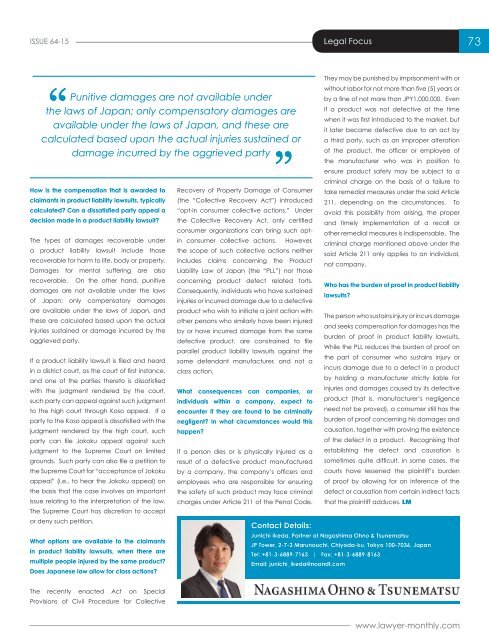EDITOR’S
LM64-15
LM64-15
- No tags were found...
You also want an ePaper? Increase the reach of your titles
YUMPU automatically turns print PDFs into web optimized ePapers that Google loves.
ISSUE 64-15<br />
Legal Focus<br />
73<br />
“<br />
Punitive damages are not available under<br />
the laws of Japan; only compensatory damages are<br />
available under the laws of Japan, and these are<br />
calculated based upon the actual injuries sustained or<br />
damage incurred by the aggrieved party<br />
How is the compensation that is awarded to<br />
claimants in product liability lawsuits, typically<br />
calculated? Can a dissatisfied party appeal a<br />
decision made in a product liability lawsuit?<br />
The types of damages recoverable under<br />
a product liability lawsuit include those<br />
recoverable for harm to life, body or property.<br />
Damages for mental suffering are also<br />
recoverable. On the other hand, punitive<br />
damages are not available under the laws<br />
of Japan; only compensatory damages<br />
are available under the laws of Japan, and<br />
these are calculated based upon the actual<br />
injuries sustained or damage incurred by the<br />
aggrieved party.<br />
If a product liability lawsuit is filed and heard<br />
in a district court, as the court of first instance,<br />
and one of the parties thereto is dissatisfied<br />
with the judgment rendered by the court,<br />
such party can appeal against such judgment<br />
to the high court through Koso appeal. If a<br />
party to the Koso appeal is dissatisfied with the<br />
judgment rendered by the high court, such<br />
party can file Jokoku appeal against such<br />
judgment to the Supreme Court on limited<br />
grounds. Such party can also file a petition to<br />
the Supreme Court for “acceptance of Jokoku<br />
appeal” (i.e., to hear the Jokoku appeal) on<br />
the basis that the case involves an important<br />
issue relating to the interpretation of the law.<br />
The Supreme Court has discretion to accept<br />
or deny such petition.<br />
What options are available to the claimants<br />
in product liability lawsuits, when there are<br />
multiple people injured by the same product?<br />
Does Japanese law allow for class actions?<br />
Recovery of Property Damage of Consumer<br />
(the “Collective Recovery Act”) introduced<br />
“opt-in consumer collective actions.” Under<br />
the Collective Recovery Act, only certified<br />
consumer organizations can bring such optin<br />
consumer collective actions.<br />
However,<br />
the scope of such collective actions neither<br />
includes claims concerning the Product<br />
Liability Law of Japan (the “PLL”) nor those<br />
concerning product defect related torts.<br />
Consequently, individuals who have sustained<br />
injuries or incurred damage due to a defective<br />
product who wish to initiate a joint action with<br />
other persons who similarly have been injured<br />
by or have incurred damage from the same<br />
defective product, are constrained to file<br />
parallel product liability lawsuits against the<br />
same defendant manufacturer, and not a<br />
class action.<br />
What consequences can companies, or<br />
individuals within a company, expect to<br />
encounter if they are found to be criminally<br />
negligent? In what circumstances would this<br />
happen?<br />
“<br />
If a person dies or is physically injured as a<br />
result of a defective product manufactured<br />
by a company, the company’s officers and<br />
employees who are responsible for ensuring<br />
the safety of such product may face criminal<br />
charges under Article 211 of the Penal Code.<br />
Contact Details:<br />
They may be punished by imprisonment with or<br />
without labor for not more than five (5) years or<br />
by a fine of not more than JPY1,000,000. Even<br />
if a product was not defective at the time<br />
when it was first introduced to the market, but<br />
it later became defective due to an act by<br />
a third party, such as an improper alteration<br />
of the product, the officer or employee of<br />
the manufacturer who was in position to<br />
ensure product safety may be subject to a<br />
criminal charge on the basis of a failure to<br />
take remedial measures under the said Article<br />
211, depending on the circumstances. To<br />
avoid this possibility from arising, the proper<br />
and timely implementation of a recall or<br />
other remedial measures is indispensable. The<br />
criminal charge mentioned above under the<br />
said Article 211 only applies to an individual,<br />
not company.<br />
Who has the burden of proof in product liability<br />
lawsuits?<br />
The person who sustains injury or incurs damage<br />
and seeks compensation for damages has the<br />
burden of proof in product liability lawsuits.<br />
While the PLL reduces the burden of proof on<br />
the part of consumer who sustains injury or<br />
incurs damage due to a defect in a product<br />
by holding a manufacturer strictly liable for<br />
injuries and damages caused by its defective<br />
product (that is, manufacturer’s negligence<br />
need not be proved), a consumer still has the<br />
burden of proof concerning his damages and<br />
causation, together with proving the existence<br />
of the defect in a product. Recognising that<br />
establishing the defect and causation is<br />
sometimes quite difficult, in some cases, the<br />
courts have lessened the plaintiff’s burden<br />
of proof by allowing for an inference of the<br />
defect or causation from certain indirect facts<br />
that the plaintiff adduces. LM<br />
Junichi Ikeda, Partner at Nagashima Ohno & Tsunematsu<br />
JP Tower, 2-7-2 Marunouchi, Chiyoda-ku, Tokyo 100-7036, Japan<br />
Tel: +81-3-6889-7163 | Fax: +81-3-6889-8163<br />
Email: junichi_ikeda@noandt.com<br />
The recently enacted Act on Special<br />
Provisions of Civil Procedure for Collective<br />
www.lawyer-monthly.com


